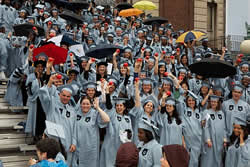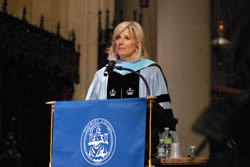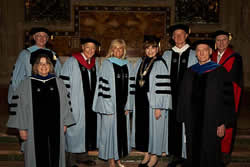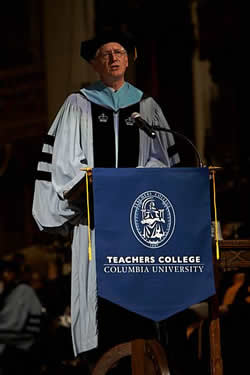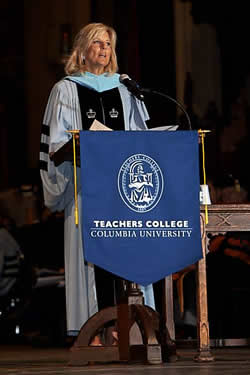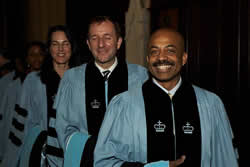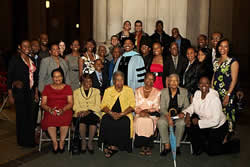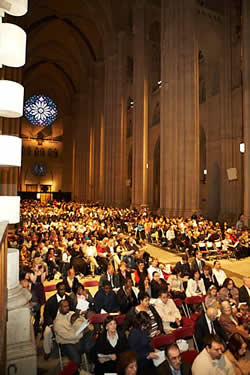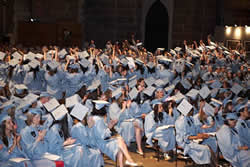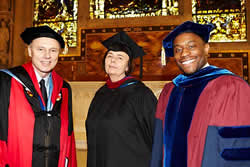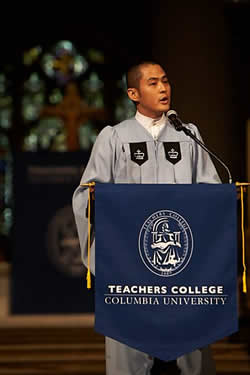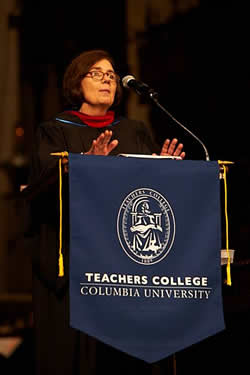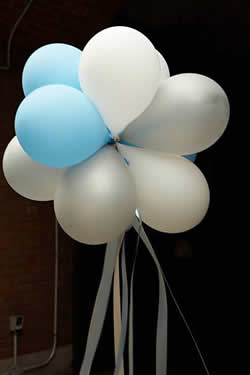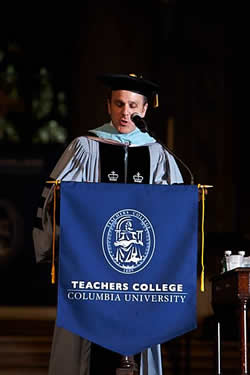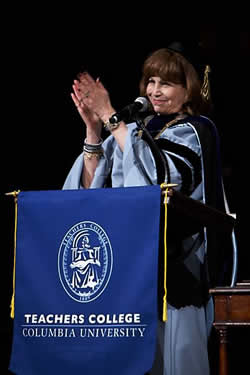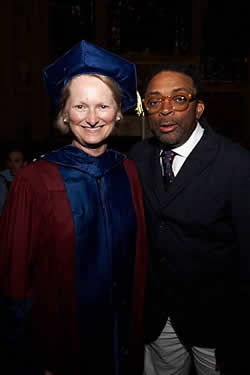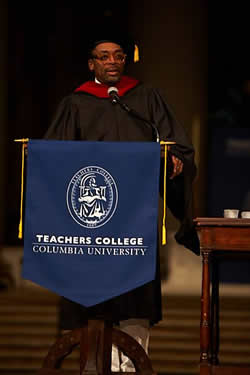Graduating Amid Challenge and Change
It’s often called “the Unfinished Cathedral”—which made the massive Cathedral of St. John the Divine an apt setting for TC’s 2010 class of master’s and doctorate graduates to embark this past week into the highly volatile climate of modern American education and public policy.
“Perhaps for the first time in history, education shines as the coin of the realm in world affairs,” President Fuhrman told two gatherings of about 1,200 master’s degree graduates on May 17 and about 240 doctoral recipients on May 18. “And yet, we are fighting uphill battles together on multiple fronts to protect this precious currency.”
TC graduates will join the fights against the dropout and obesity epidemics, ever-widening opportunity and achievement gaps, and, most important, a “rising tide of ridicule suspicion and anger, aimed at the very people who are best prepared to tackle and solve society’s toughest problems—educated professionals like you,” Fuhrman said.
To counter such perceptions, educators must avoid the mindset of specialists who, by definition, excludes issues and concerns from their purview.
“How many of you recall Dr. Leonard ‘Bones’ McCoy from the original Star Trek series?” she said. “He is best remembered for dodging any task that fell outside his medical practice.
‘I’m a doctor, not a brick layer!’
‘I’m a doctor, not a mechanic!’
‘I’m a doctor, not an engineer!’
‘I’m a doctor, not an escalator!’
And then my favorite:
‘I’m a surgeon, not a psychiatrist!’
No wonder McCoy got on Spock’s nerves!”
The time has passed, Fuhrman said for “any of us to play the McCoy card. In today’s world, where collaboration and innovation go hand in hand, we need to embrace partnerships with professionals across all fields and with the communities we serve.”
On the external front, Fuhrman exhorted students to “fight against the reverence for the bottom line that sees education strictly as a business—a business where tests wag the lesson plan and teacher performance is measured in students’ multiple-choice test scores; a business that values classroom management technique (which is important) over pedagogy, core standards, and curricular models; a business where students are customers given the last word.
“Let us be clear: You and I are not in ‘the education business,’ she said. “We are, however, very much responsible for the business of education and learning.”
The ceremonies were punctuated by several emotional high points. During the doctoral ceremonies, the Cathedral rocked with applause when Fuhrman acknowledged Dennis Chambers, a TC security officer who was receiving his doctorate in adult learning and leadership after many years at the College. And at the evening master’s degree ceremony, student speaker Jaymie Stein, who was receiving her degree in Art and Art Education, wowed the audience with a giant “Peace Puppet” she had created in honor of young students she has worked with through the Harlem Children’s Zone.
An additional cast of prominent speakers delivered their own thoughts about the importance of teachers, service work and research.
Jill Biden, community college educator and wife of Vice President Joseph Biden, addressed the doctoral candidates. Biden holds a doctorate in education and teaches at a community college near the White House. She is a prominent advocate of community colleges as a path to higher education and better jobs.
“We know that education is the key to unlocking human potential,” Biden said. “And we know that today, in elementary schools, high schools, community colleges, and universities, millions of students are ready—and that it is a teacher who can spark their love of learning into a fire that burns for a lifetime.”
Biden was joined at the doctoral ceremony by TC alumnus and former
The filmmaker Spike Lee addressed the evening ceremony of master’s graduates May 17.
Declaring, “I am an educator also,” Lee, who teaches in the graduate film program at NYU’s
“She saved her Social Security checks and put me through college, so I’m a product of what education can do,” Lee said. But, he cautioned, “We live in a time when education is devalued—kids don’t want to learn to read, they just want to be on the Internet—so you have a much harder task than back when I was a student.”
Gail Collins, a columnist for The New York Times and previously (from 2001 through 2007), the first female editor of the paper’s editorial page, was alternately humorous and cautionary in her address to master’s recipients on May 17. The devastating effect of the current budget crisis on education budgets, and taxpayers’ general unwillingness to pay more for the services of teachers and other public servants, will pass, Collins said. “Soon, they will be on their knees begging for your services.”
Meanwhile, Collins added, teachers and others in publicly funded helping jobs should keep their humor. She said she get e-mails from retired teachers in
The student speakers, too, sounded notes of both urgency and hope. Stein drew analogies between the comments of her young art students and the ideas of some of TC’s greatest minds—for example, Sophie, a third grader, who asks, “Why can’t we have three periods of art instead of one?” and professor emerita Maxine Greene, who said, “By imagining, we think of things as if they were otherwise.” Asserting her belief that “we are all creative members of the community,” Stein, who co-founded TC’s Go Green initiative, said, “as TC grads we have a lot to offer the world. No doubt we will.”
Patrick Ko, a master’s degree graduate from the
“These problems may seem insurmountable, but we must face them. Hard work must be done to change the landscape—to carve out a more promising journey for our future generations. Activism, advocacy and policy work are essential for social change.” To do that, TC graduates must “exemplify lifelong learners” and “give ourselves the authority to lead.”
In her address, Fuhrman declared that, despite the challenges in today’s environment, “This is a fabulous time for this group of future leaders to be entering the world of government, academe, the health professions, or the classrooms with a degree from Teachers College.” She concluded:
“Long ago, Emerson told a room full of scholars much like yourselves, “This time, like all times, is a very good one … if we but know what to do with it.”
Published Wednesday, May. 19, 2010
